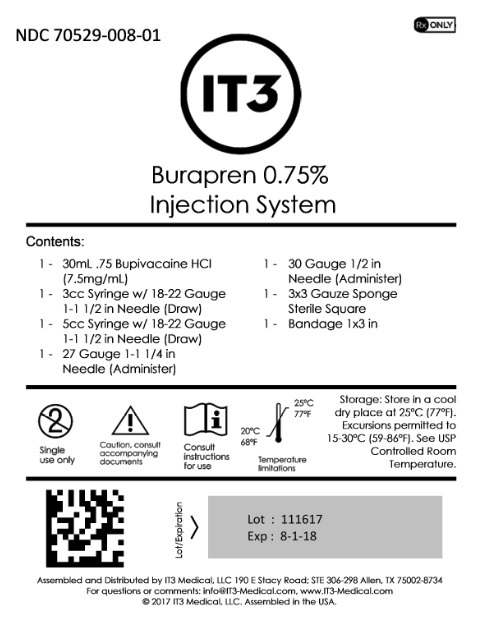Burapren 0.75% | Bupivacaine Hydrochloride Injection while Breastfeeding

What is Burapren 0.75% | Bupivacaine Hydrochloride Injection used for?
Is using Burapren 0.75% | Bupivacaine Hydrochloride Injection unsafe in breastfeeding? Can there be bad consequences for baby if I use it while breastfeeding?

Nursing Mothers Bupivacaine has been reported to be excreted in human milk suggesting that the nursing infant could be theoretically exposed to a dose of the drug. Because of the potential for serious adverse reactions in nursing infants from bupivacaine, a decision should be made whether to discontinue nursing or not administer bupivacaine, taking into account the importance of the drug to the mother.
Burapren 0.75% | Bupivacaine Hydrochloride Injection Breastfeeding Analsys
Bupivacaine hydrochloride anhydrous while Breastfeeding
SafeCAS Number: 38396-39-3
Local anesthetic agent which is used for infiltration and nerve-blocking procedures included Epidural anesthesia. It is excreted into breast milk in non-significant amount, with no side-effect observed on breastfed infants of treated mothers. Plasma levels in those infant were undetectable. There is controversy about the effect of drug-mediated analgesia used during the child birth (e.g. epidural injection of local anesthetics plus Fentanyl or alone) on the mature milk coming in, whether by delaying the onset of Lactogenesis phase II, or, by affecting the ability of the child for sucking. Some studies have shown a higher risk for delay of initiation of Lactogenesis phase II (milk coming in) longer than 3 post-natal days, but without effect on loss of initial weight. On other studies, the newborn infant appears to have higher risk for delay on first latch-on, higher body temperature and irritability or somnolence. Because of the latter, it is argued that those mothers would be in need of more support on breastfeeding when they have received ante or intra partum analgesia. However, other authors have failed to find the same results. There is consensus on the achievement of higher milk production and higher body weight increase in the neonate with an adequate pharmacological control of pain after C-section or vaginal childbirth.
Burapren 0.75% | Bupivacaine Hydrochloride Injection Breastfeeding Analsys - 2
Bupivacaine hydrochloride anhydrous while Breastfeeding
CAS Number: 38396-39-3
Because of the low levels of bupivacaine in breastmilk, and it is not orally absorbed, amounts received by the infant are small and it has not caused any adverse effects in breastfed infants. Bupivacaine labor and delivery with other anesthetics and analgesics has been reported by some to interfere with breastfeeding. However, this assessment is controversial and complex because of the many different combinations of drugs, dosages and patient populations studied as well as the variety of techniques used and deficient design of many of the studies. In contrast, epidural bupivacaine begun clamping of the umbilical cord appears to enhance breastfeeding success because of improved pain control. Overall it appears that with good breastfeeding support epidural bupivacaine with or without fentanyl or one of its derivatives has little or no adverse effect on breastfeeding success.[1][2][3][4][5] Labor pain medication may delay the onset of lactation.
I am nursing mother and I have already used Burapren 0.75% | Bupivacaine Hydrochloride Injection, what should I do?
As usage of Burapren 0.75% | Bupivacaine Hydrochloride Injection is mostly safe while breastfeeding hence there should not be any concern. In case of any change in behavior or health of your baby you should inform your health care provider about usage of Burapren 0.75% | Bupivacaine Hydrochloride Injection else no further action is required.
My health care provider has asked me to use Burapren 0.75% | Bupivacaine Hydrochloride Injection, what to do?
Definitely, Burapren 0.75% | Bupivacaine Hydrochloride Injection is safe in lactation for baby. No wonder your doctor has recommended it.
If I am using Burapren 0.75% | Bupivacaine Hydrochloride Injection, will my baby need extra monitoring?
No extra baby monitoring required while mother is using Burapren 0.75% | Bupivacaine Hydrochloride Injection
Who can I talk to if I have questions about usage of Burapren 0.75% | Bupivacaine Hydrochloride Injection in breastfeeding?
US
National Womens Health and Breastfeeding Helpline: 800-994-9662 (TDD 888-220-5446) 9 a.m. and 6 p.m. ET, Monday through Friday
UK
National Breastfeeding Helpline: 0300-100-0212 9.30am to 9.30pm, daily
Association of Breastfeeding Mothers: 0300-330-5453
La Leche League: 0345-120-2918
The Breastfeeding Network supporter line in Bengali and Sylheti: 0300-456-2421
National Childbirth Trust (NCT): 0300-330-0700
Australia
National Breastfeeding Helpline: 1800-686-268 24 hours a day, 7 days a week
Canada
Telehealth Ontario for breastfeeding: 1-866-797-0000 24 hours a day, 7 days a week
